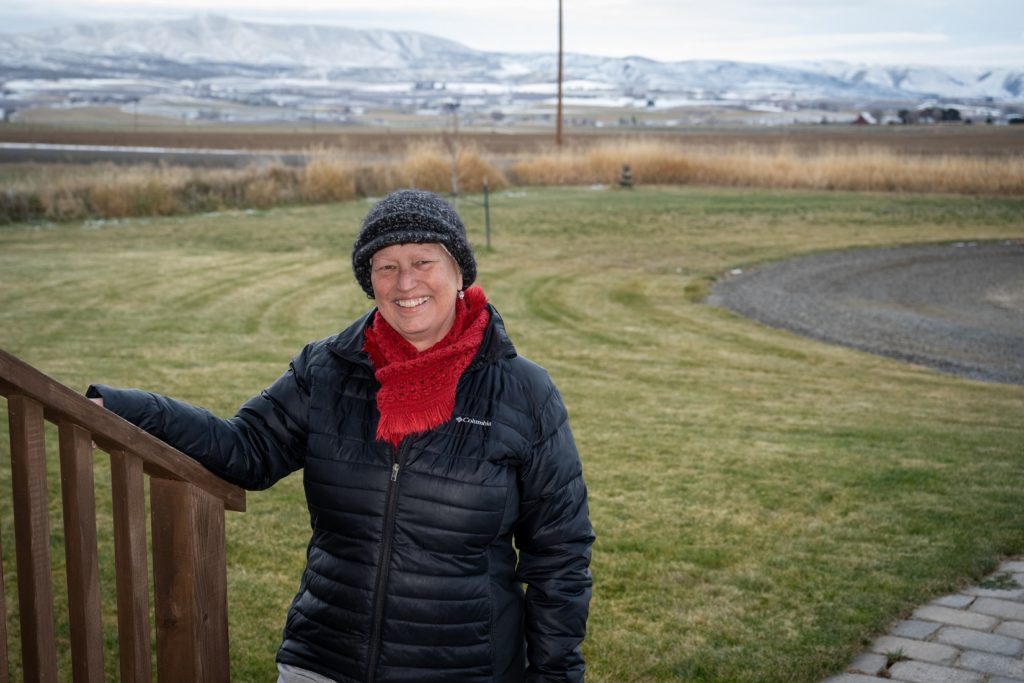
Debbie Hulbert loved to work in her garden, growing vegetables. A graphic designer by trade, she also loved to cook and paint, and had plenty of energy to do it all, until one day in late July 2021, when she found a lump.
Two weeks later, she received an official diagnosis: triple-negative breast cancer (TNBC). Aggressive treatment resulted in total hair loss, mouth and sinus trouble, digestive tract issues, and more. “The chemo is chasing after anything that replicates quickly,” Debbie explains. Which is why she needed a transfusion of platelets in November. Impacted by the hospital capacity issues that have been in recent news, KVH didn’t have room for Debbie at the time, so she was sent to a major Seattle hospital to recover.
It wasn’t long before she was dealing with neutropenia. “My white blood cells were basically non-existent,” she says, making her vulnerable to any kind of bacteria or virus. She relapsed in early December. “I was on a strong antibiotic to combat an infection, but my fever had broken through it.” She needed treatment immediately.
Her oncologist called KVH Hospital to inform them his patient was on her way in. ER staff had the Hulberts pull into the ambulance bay, where they wheeled her directly into the emergency unit, rather than having her enter through the front lobby. “They were concerned with reducing my exposure to others in the hospital,” she says.
Debbie was later transferred to the Medical/Surgical Unit, where staff followed “very careful protocols. They made sure to let me know exactly what they were doing at all times,” says Debbie. “They showed me how they were protecting me.” At one point, when the sound of harsh coughing filled the halls, staff reassured her of her safety.
“There was no COVID on the floor at the time,” she recalls, concerned after being exposed to the virus during her Seattle hospital stay. Debbie learned that Med/Surg staff at KVH were assigned to specific areas within the unit, and only certain people would be allowed to enter her room, to ensure the highest levels of safety for their vulnerable patient.
“I felt incredibly safe,” says Debbie. “Everyone that came in my room addressed me, talked to me – housekeeping, nurse’s aides, nurses, doctors – they treated me like a human being, making sure I was comfortable and had everything I needed.”
It was impossible for Hulbert not to compare her treatment with the west side experience she’d had just weeks earlier. “I stayed on the top floor in a state-of-the-art medical facility. Seattle hospital rooms don’t get better than that.” And yet, “I was a room number,” Debbie says. “I would sometimes have to wait a half an hour to get help to go to the bathroom.”
As an inpatient at KVH, “When I rang the bell, someone was there in 30 seconds,” which mattered a lot to Debbie when dealing with, among other things, intense bouts of diarrhea.
More importantly, Debbie felt seen. “The care, the compassion, the idea that everyone that talked to me, they’d come in and say, ‘How’re you doing today?” And they’d remember something we’d talked about the day before. I really mattered, you know, as a human being and not just a patient in a room,” she says. “I felt safer there, I felt seen there, I felt cared for.”
Treated with broad spectrum drug IVs, Debbie remained in the hospital until her cultures were clear and staff knew she was safe to go home, armed with two more antibiotics to cover anything that the IV medications could have missed. “I went home feeling stronger than I had in a month or more,” she said.
While Debbie has a long way to go in her battle with cancer, she’s already looking forward to resuming her creative lifestyle. She occasionally paints acrylic pieces in her bathroom when she has the energy, inspiring her husband: “He carved out a part of his shop to make me a paint studio,” she crows. “Once I’m feeling stronger, I’ll have my own studio to paint in.”